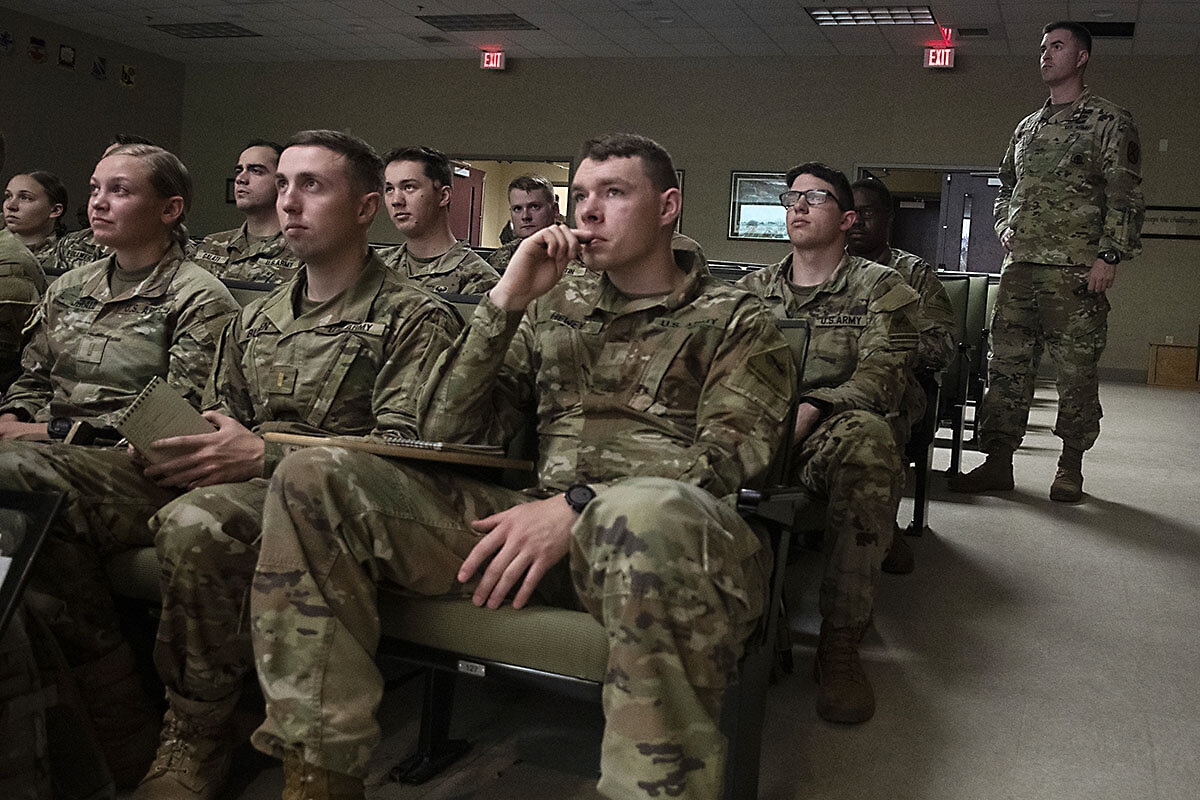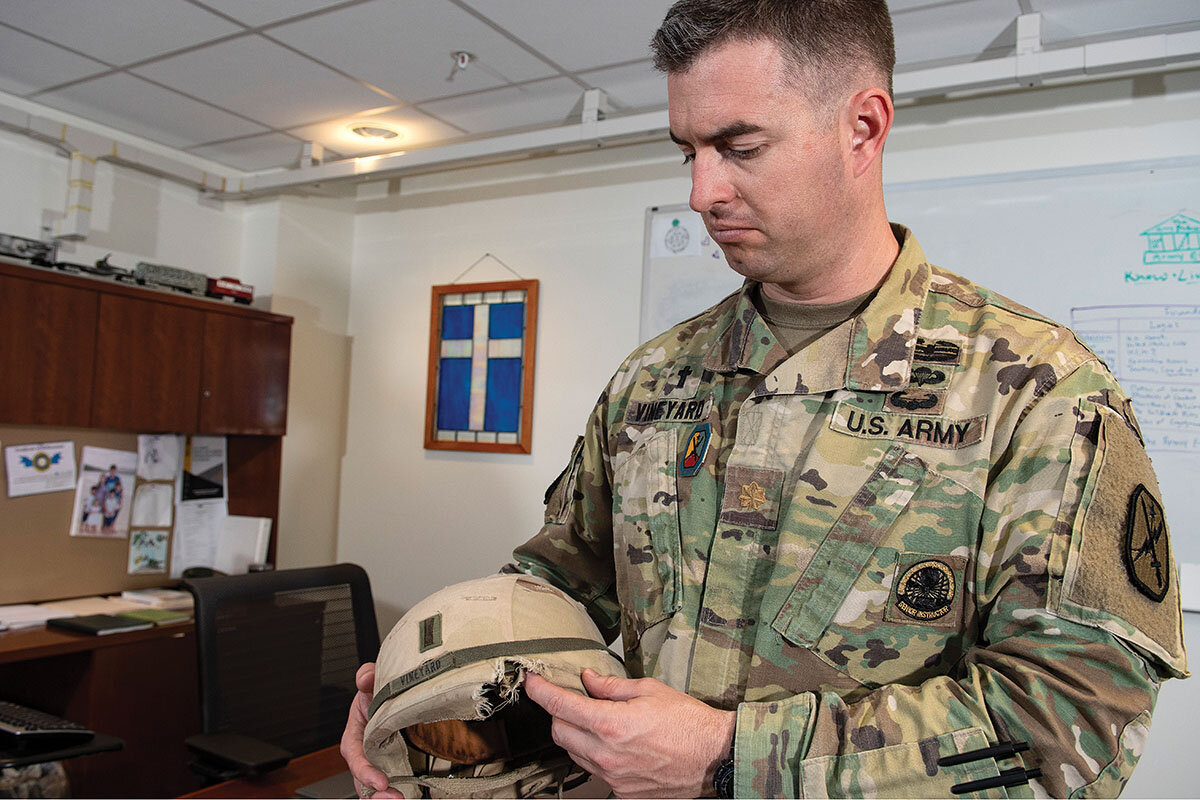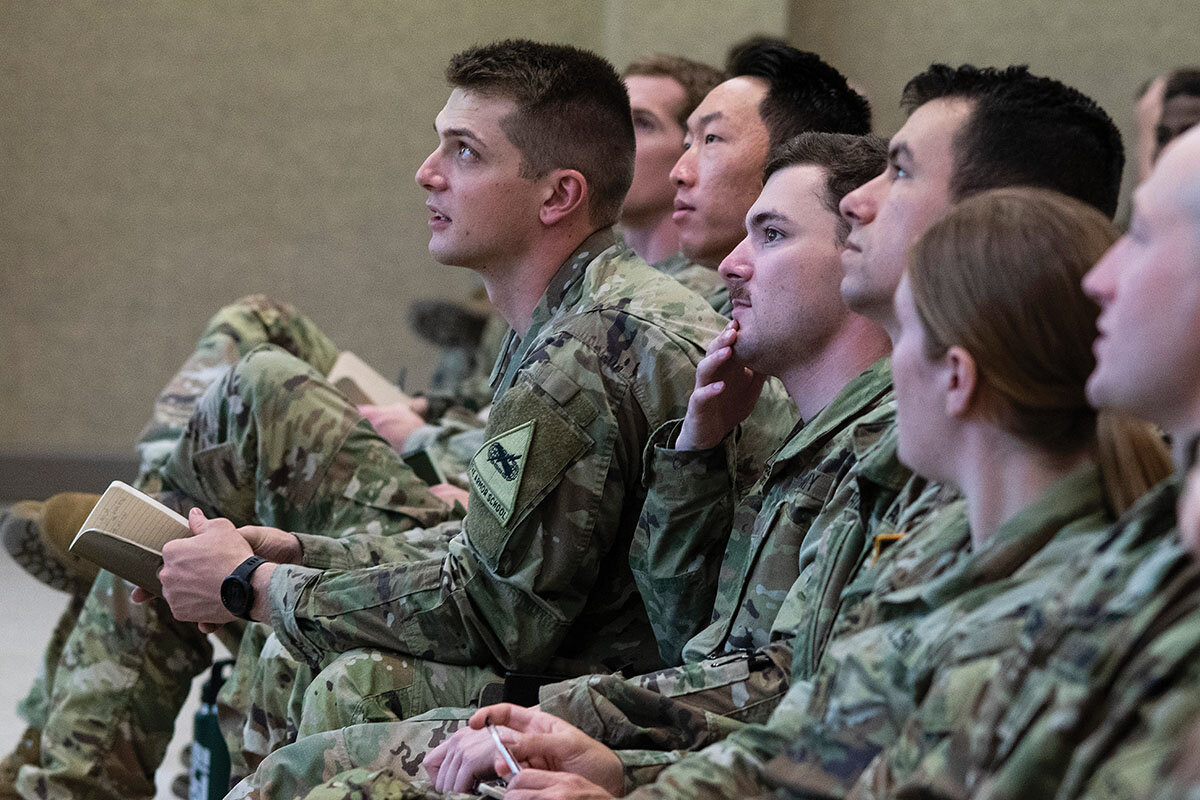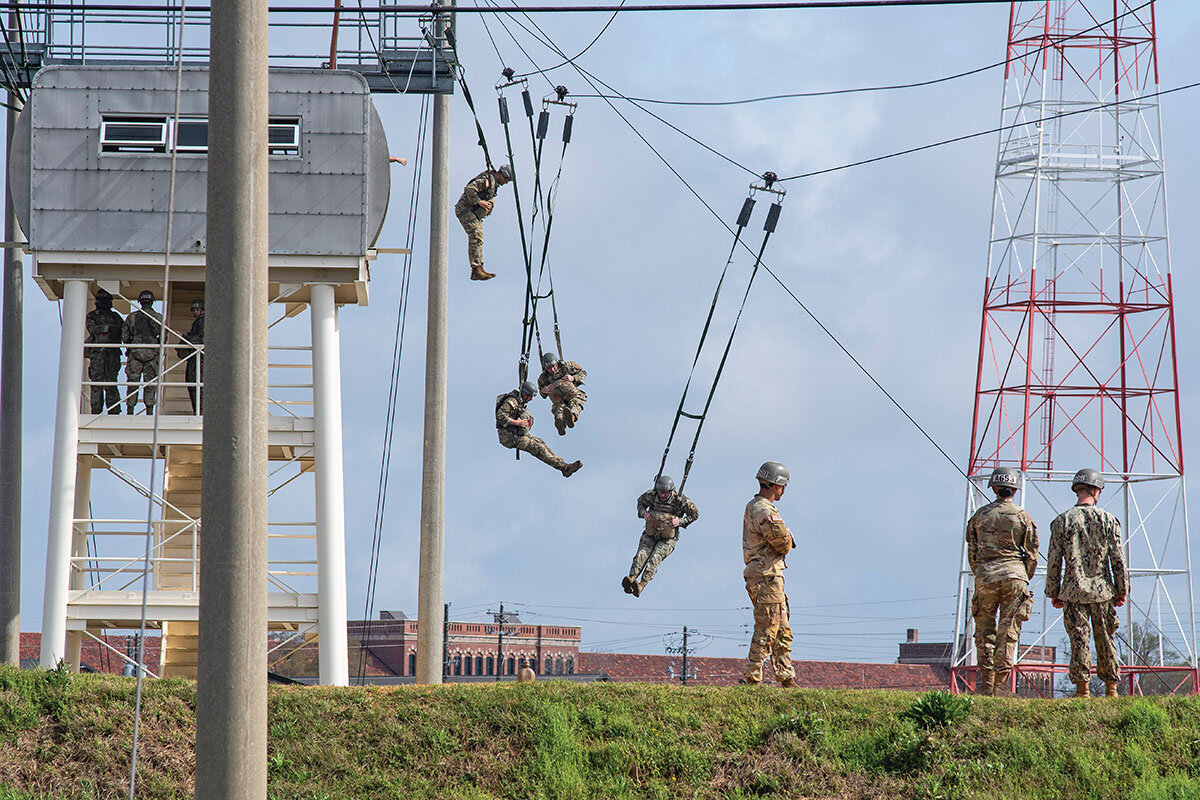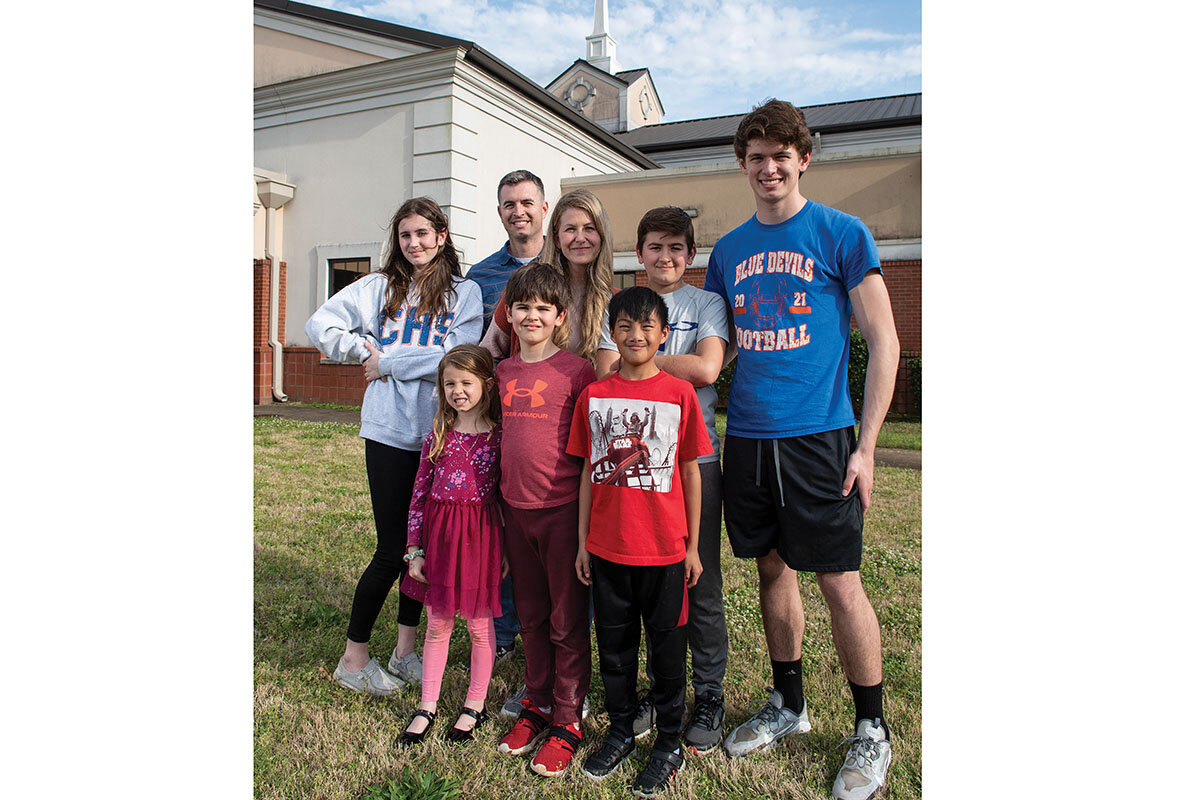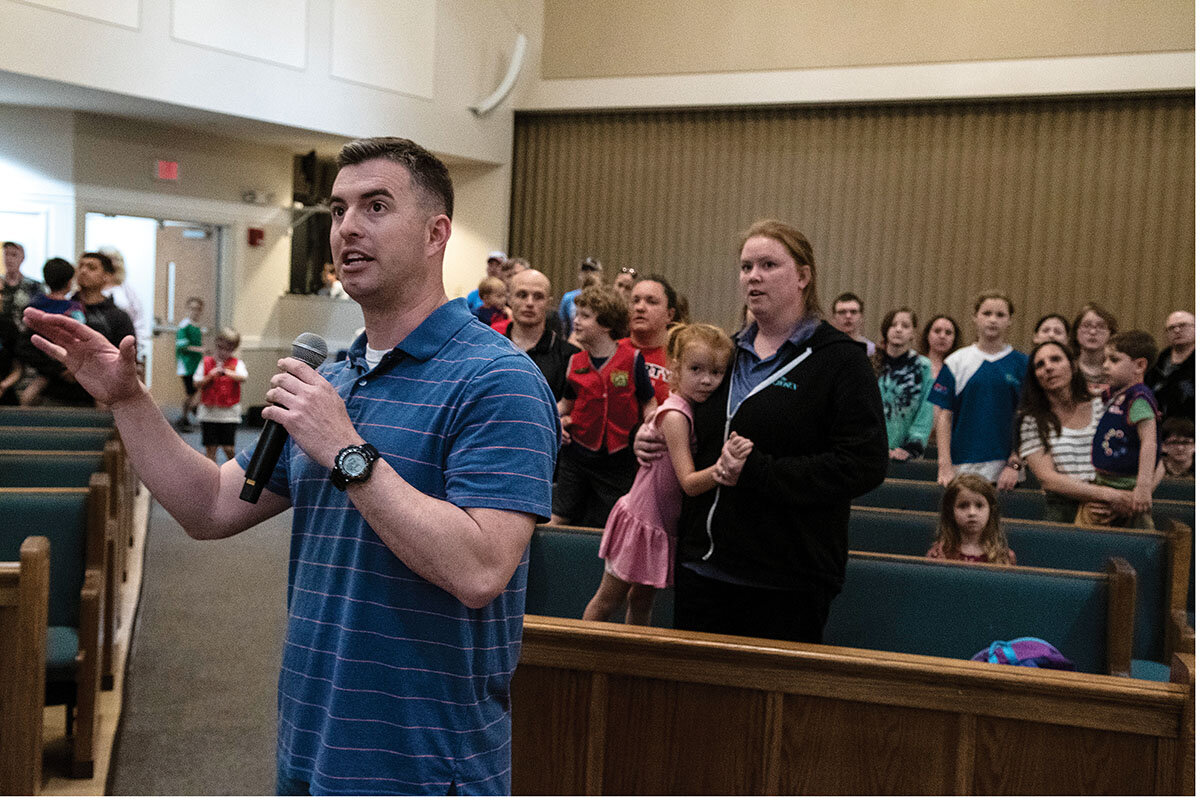Maj. Jared Vineyard loves the Army. This, despite the car bomb in Iraq that took the lives of eight in his platoon. This, despite the faces around him of combat veterans who have seen “too much.”
Major Vineyard, an Army chaplain, U.S. Military Academy at West Point graduate, and decorated war veteran, is emerging as one of the military’s premier ethicists. He is charged with illuminating the line between right and wrong at a time when war seems but a hair trigger from peace, when the ways to kill grow ever more sophisticated, when the consequences stream round the world instantaneously.
But where some see danger, Major Vineyard sees opportunity. “The ability to do good is probably higher in the Army than in any other profession,” he insists.
That’s not necessarily obvious here at Fort Benning, Georgia, where people come to learn to kill. Some 60,000 soldiers train at the base every year, learning to shoot, jump from planes, crawl to cover. It’s a place where camo is regulation, not fashion; where boots are heavy and hair is sheared; where acronyms – IED, RPG, WMD – are a principal part of speech. The massive base covers some 285 square miles.
Its Maneuver Center of Excellence (MCOE) trains soldiers to win wars. Major Vineyard’s job here is to make sure they win them ethically, in a way that reflects the laws and values under which the Army operates. Ethics protect soldiers from what he calls “moral injury,” the psychological damage that can come from doing the wrong thing. They also protect nations from committing the kinds of atrocities that the United States did at My Lai during the Vietnam War, and Russia does almost daily in Ukraine.
In his 2 1/2 years at Fort Benning, Major Vineyard has taught more than 15,000 soldiers, most of them officers. His lectures provoke, inspire, entertain, and challenge. They are laced with personal stories of his own and others’ experiences, stories shared among soldiers, but – as personal war stories tend to be – kept within the fold. Beyond the presentations and diagrams, ethical leadership comes down to two questions, he says: “Can I do it?” and “Should I do it?” Military decisions that are moral as well as legal allow warriors to “sleep the sleep of the just,” he says.
“All of the lieutenants who have come through Fort Benning, all of the captains who have come through Fort Benning for their professional military education, all of the future battalion and brigade commanders who come through Fort Benning – Jared Vineyard’s thumbprint is on every one of them,” says Col. Craig Butera, director of the MCOE’s Command and Tactics Directorate. “And I’m just convinced our Army is better for that.”
Inspired by his grandfathers, who both served in World War II, Major Vineyard knew as a child he wanted to be a soldier. War became real for him on Sept. 11, 2001. A senior at West Point, arriving for a lecture on terrorism, he along with his classmates initially thought the terrorist attacks on the Pentagon and World Trade Center that they saw on the classroom screen were part of a training video. “We’re probably five minutes into class, and no one said a word and everybody just watched,” he recalls. The instructor muted the screen. “He looked at us and said, ‘Gentlemen, your nation is at war. Class dismissed. Go to the barracks and wait for further instructions.’”
War became even more real two years later when Lieutenant Vineyard, then an artillery officer outside Baghdad, was struck by a car bomb as he and his platoon cleared safe passage for engineers. Loaded with 500 pounds of dynamite, TNT, and artillery shells, the bomb exploded about 15 feet from the group.
“We had no idea what was going on when the explosion happened,” he says. “I was in the air going backwards, and I was just surrounded by fire.”
Eight of his platoon members died in the blast, and its aftermath would test the faith that he had held firm since he first embraced Jesus at age 7 in vacation Bible school. “Everybody was gone.”
Sweats, nightmares, chaos, and trauma haunted him at the German hospital where he had been taken by medvac helicopter. His faith offered no consolation. Finally, desperate, he got on his knees next to his hospital bed and gave up the struggle.
“I said, ‘God, I’m going to give this to you. What was meant for evil, use it for good.’” Today, he says, “I believe God just honored that prayer. Right away I felt like something was scooped out of me.” He has not had a nightmare since, and though the tragedy of the loss remains with him, he feels freed to use it for good.
The spiritual transformation ultimately led him to the ministry. He received his master of divinity from Southwestern Baptist Theological Seminary in Fort Worth, Texas, in 2008, and for four years afterward worked in civilian life as a youth pastor. He and his wife, Amanda, a former professional ballerina, lived their dream, working side by side, ministering as a couple and raising their children – who today number six, ages 6 to 16.
While satisfying part of his Army Reserve requirement, the chaplain further clarified his sense of calling. He was assigned to Fort Hood, Texas, the sixth choice on his list of preferred job assignments. As with other life-turning moments, he sees that as no random event. One day he was shadowing a base chaplain, listening quietly at the bedside of a wounded soldier. “[The soldier] is basically sharing what happened to me,” he says. “He was in an explosion, guys on his right and left died, and the point of his story is, ‘I have no hope.’”
The senior chaplain told the soldier he was sorry to hear that. Mr. Vineyard jumped in. “I said, ‘You’ve got the wrong ending. ... Let me tell you about my story.” His message resonated. Hope returned. As a result, the junior chaplain would wind up back at war.
“What was so hard for me about the decision to return to the Army was that my wife and I are really close, and for those four years, we did ministry together, and it was awesome.”
But he returned to the front lines, this time in Afghanistan, embedded as a chaplain with the 2-506th Infantry Battalion, 101st Airborne Division, made famous by the HBO series “Band of Brothers.” Offering counsel for needs temporal as well as spiritual, he often just listened. He recalls one soldier, the stereotype of a big, tough, reserved infantryman. “He had some massive, massive things that were weighing on him. I’m just not feeling really led to say anything, just to kind of listen to him, and we got to the end of an hour, and he says, ‘You ... are the best counselor that I can imagine.’ I chuckled.”
Today, after graduate studies in ethics at Yale Divinity School, he is one of 17 chaplains and two world religion instructors charged with formally training Army personnel in ethics.
The chaplain approaches his Fort Benning lectures with the zeal of a preacher. On one recent morning, he peppers the 150 captains in class with questions about ethical leadership.
He references the World War II movie “Saving Private Ryan,” screening an emotionally charged scene in which a group of soldiers, bent on revenge after its medic was killed by the enemy, debates what to do with a prisoner of war. The real-life complexities they often find themselves in muddy what should be a clear ethical decision: You never kill a prisoner.
The commander, played by Tom Hanks, winds up releasing the man, but his intentions leading up to the decision seem ambiguous, and this gives Major Vineyard an entree: What did the commander do here that was wrong? What was right? How can a leader balance competing values? Even if he ends up doing the right thing, can his attitude risk inciting one of his soldiers to make a mistake? There may not always be a clear right answer, but there is often a clear wrong one, he tells the officers.
Killing a prisoner of war is always wrong, according to the Army. So is failing to treat the enemy humanely, a “principle of honor” famously violated by American service members at the Abu Ghraib prison in Iraq. Also always wrong: intentionally failing to distinguish combatants from civilians, as happened at My Lai. An attack that has no military necessity is also always wrong, says Major Vineyard.
The Army uses “ethical, effective, and efficient” as benchmarks for right decisions, with the ethical component rooted in military necessity. The Army forbids unnecessary suffering and urges soldiers to exercise a sense of fairness, respect, and even honor toward opposing forces.
“I came in aggressive,” the chaplain explains of his lecture. He wants students to know that in the swirl of training, ethics “is the main event, not a sideshow.” The saying is a favorite of a teacher noted for his storehouse of memorable quotes: “You are the standard.” “Be that person.” “Leaders are readers.” “Be there.” “Beware, lest you become the monster you perceive your adversary to be.”
“He has a gift for communicating,” says Jason Baker, second lieutenant in the Georgia National Guard, who studied under Major Vineyard as a student at Officer Candidate School last year. “In class you can feel the passion of his personality and of his experience and so as a result, there were no sleepy eyes in my class. There were no disinterested faces.”
Especially early in training, when soldiers are being taught to think as part of the “collective,” ethics class stresses independent thought – the ability to recognize, for instance, whether an order is strictly legal or whether it is legal and moral, Second Lieutenant Baker says. “Because obviously throughout history, we have many examples of lawful orders that may not be moral orders.”
Still, the classroom and combat are two entirely different theaters. Major Vineyard, as a result, wants his charges to develop moral “muscle memory.” “When you get punched in the face, your ethical gloves better not come off,” he warns his students.
Cultural differences complicate moral decision-making. Opponents with different values exploit American ethical standards for their own advantage, using women or children as shields, for instance, or sending 12-year-olds out with guns. Major Vineyard calls reports of civilians intentionally being bombed in Ukraine “a reminder that our adversary, whoever it is, probably doesn’t fight like we do.”
In order to do the right thing, soldiers need to know what the right thing is. For that, the Army has “great doctrine,” the teacher tells his class. It’s rooted in the ancient Greeks – Aristotle, Plato, and Socrates – in the “just war” doctrine of St. Augustine, and in the culture and spirit of the American people. It draws on the famous Soldier’s Creed, the seven Army values, on established rules of engagement, treaties, and ultimately the U.S. Constitution. Decisions are tested against often-competing philosophies of Immanuel Kant and John Stuart Mill: Is this what a virtuous person would do? Would you like to see everyone required to abide by this choice? Would it bring the best benefit to the greatest number of people?
“Who we are as an Army is your shield of protection,” he tells his class.
What if an order seems wrong? “We are never called as soldiers in the Army to do anything illegal, immoral, or unethical,” he says after class. “So if we believe something is immoral, there are two R’s: reject and report.” For broader moral objections, the long-standing principle of exercising conscience – though not part of Army doctrine – allows members to resign.
Since George Washington established it in 1775, the Chaplain Corps has concerned itself with moral character, initially warning soldiers off cursing and drunkenness. After World War II, a weekly “Chaplain’s Hour” radio program promoted virtue, and the Army advertised itself as a place where military personnel emerged better people than they were when they went in.
Lt. Col. Seth George, Deputy Combined Arms Center chaplain at Fort Leavenworth, Kansas, who oversees all of the Army’s ethics instructors, says that the ethics effort intensified after Vietnam and the institution of the draft. The military was also demoralized after the war.
“In the late ’70s and ’80s, they were really looking at ‘How do we professionalize our Army?’ And that included everything from uniform standards, to tactical competency, to professional leadership, so that you have leaders that build trust,” he says.
The effort continues to evolve today, with a new field manual emphasizing holistic soldier readiness. “What does a soldier who’s ready for the mission look like? How are they performing? Are you mentally sound? Are you physically fit? Do you have a routine for sleep and nutrition? Are you spiritually connected or are you isolated?” says Lieutenant Colonel George. “It’s trying to communicate to commanders that there’s more than just the strict utility of accomplishing the mission.”
Looking at the mission through the lens of values illuminates behavioral standards, he says. “What does it look like to not only say, ‘I accept the Army values of courage and selfless service’? But how do I now engage another individual in my unit with dignity and respect?”
Colonel Butera speaks of societal “corrosives,” which also affect the Army, such as sexual harassment, political extremism, and discrimination. “If everybody was acting perfectly in alignment with the Army values and the Army Ethic, then we wouldn’t have these problems,” he says. “But we do have these problems. So it’s important that we continue to have leaders engaged with their populations, their followers, their counterparts. You have a responsibility to the American people.”
While a student at Yale, Major Vineyard visited the university’s art gallery, where he came upon “The Veteran,” Thomas Eakins’ portrait of George Reynolds, a Medal of Honor recipient depicted 20 years after his service in the Civil War. The chaplain says that, even before he knew the subject of the painting, he recognized in the eyes someone who had seen combat – one who, as he puts it, “has experienced the brokenness of the world.”
In his work as a chaplain, Major Vineyard has seen the look. “You just see the fullness of innocence lost, like the war never left them. After the Civil War they called the look ‘the soldier’s heart’ – what we might call today post-traumatic stress disorder or moral injury, though they’re not all the same thing.”
“Combat changes you,” he goes on. “You can come out better or you can come out worse. You get a vote in that.”
He recalls the potentially disabling emotion he felt in 2004, after a vehicle two cars ahead of him in a caravan was bombed in an ambush. His unit was already suffering unrelenting casualties. “You can see where you have empathy for people who lose it,” he says of his response to the attack. The warrior who has seen too much needs to know, he says, “What are you going to give me, Army?”
For some, relationships with fellow combat veterans have spiritual overtones that can be redemptive. “Yes, it’s hard. But you’ve got another family now,” he says of the military. “For the rest of your days, here’s another family that – they just know. And the neat thing is, it doesn’t even have to be [people] of your generation. You’re one of us.” It wasn’t until he returned from Iraq that his grandfather spoke of his own experiences in World War II.
Major Vineyard’s lifelong relationship with God, put to the test, saved him. When ministering to other believers, he talks about it. He guides nonbelievers to timeless principles – encased in religion but accessible to everyone – principles like “choose life,” principles like the golden rule. “I wouldn’t quote the Bible, but I would say, ‘Hey, I think in your heart, you understand that there’s choices that you get to make. There’s destructive, and there’s helpful, and my challenge for you is choose the helpful.’”
“I’ve seen transformation happen with soldiers. And I’ve seen the other as well. It’s hard to see sometimes. Sometimes they’ll listen, and sometimes they won’t. ... I say, ‘I can’t be your Messiah. I can’t save you. ... I can give advice. I can be here. I can listen. But, you know, you get a choice in this.’”
By Wednesday evening, Family Night at the on-base chapel, the chaplain is in full-on pastor mode, his rapid-fire delivery still intact. Leading a Bible study group, he draws laughter from the class as he likens God’s excluding Moses from the Promised Land to regime change. He’s home – a place where a Scripture citation illustrates everyday experience, where believers talk of a God who speaks to them personally, and where he and his wife listen for divine guidance in every decision.
“He practices what he preaches – very much,” says Amanda Vineyard, who reaches out to base families through children’s programs and marriage enrichment wherever the couple is stationed. “I feel like the happiest military couples feel called to it – like this is our adventure and we’re in it together.”
Major Vineyard is legendary for being accessible to soldiers – on the base and after they move on. “He’s still incredibly responsive, even to little old me,” says Second Lieutenant Baker, the Georgia Army National Guard member. “I know that I can text him right now and hear back from him today. But that’s not only me. He would do that for any soldier.”
And the soldiers do benefit from his help.
Colonel Butera, illustrating the “Be there” ethic of the chaplain, shares a story. “I’ll try not to get choked up in offering this,” he says, eyes filling. “But there was somebody who I heard say that they owe their life to him, just through him being accessible during a certain challenging time. I mean if that’s not impactful, I don’t know what it is.”



